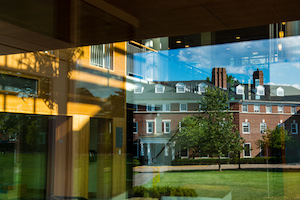 Students gathered virtually on Wednesday for Community Day, during which they attended sessions focused on equity, justice, and anti-racism.
Students gathered virtually on Wednesday for Community Day, during which they attended sessions focused on equity, justice, and anti-racism.
Coordinated by the student-led Self-Governing Association and the Office of Multiculturalism and Community Development, the day offered presentations and discussions on topics including race and politics, gender justice, artists of color, community engagement, environmental racism and justice, deaf culture, activism by athletes, and more. Sessions were led by students and faculty as well as alumni, including Jovonna Jones ’11 and Eleanor “Tabi” Haller-Jorden ’75, P ’09.
The student Asian Society hosted a session on the COVID-19 pandemic’s impact on Asian Americans, demonstrating the drastic economic downturns in major cities’ Chinatowns and Asian-owned businesses, increased violence against Asian and Asian American people, and the negative effect of leaders like former President Donald Trump referring to COVID-19 as the “China virus,” and other offensive terms. Such terms propagate harmful stereotypes of Asian people and lead to real harm, said Daryn Wong ’22.
“This deliberate wording has had devastating effects on Asian communities, as having a person of such authority and power in the United States say such things validated racist sentiments,” Wong said. “Politicians are responsible for their language. The wording they use has a significant impact on public opinion. It associates the virus with a whole ethnicity, harkening back to anti-immigrant policies in history and may contribute to violence.”
Haller-Jorden, a member of Milton’s Board of Trustees and the Schools Diversity, Equity, and Inclusion Committee, led a session called “The Craft of Gender Justice: Mindsets and Skill Sets.” She has worked toward social change through research, providing data that show the business benefit of gender diversity in organizations, but said progress can be “glacially slow” without changing mindsets and management attitudes. She explained that although there are plenty of articles and statistics supporting gender diversity in workplaces, personal stories may help those in power see the real impact of discrimination on people’s lives.
Our own biases can prevent us from seeing the way decisions affect those whose lives are different from us, so managers and leaders need to hear about the real lives in diverse communities, she continued.
“It’s not through, necessarily, data alone that we can change people’s mindsets,” Haller-Jorden said. “I think stories and personal experience have potentially far more influence. One of the things I like to say is, ‘Statistics stun and trend lines trouble, but no one changed their life because of a pie chart.’ Rather than just talking about a business motivation, we need to look at personal motivation.”